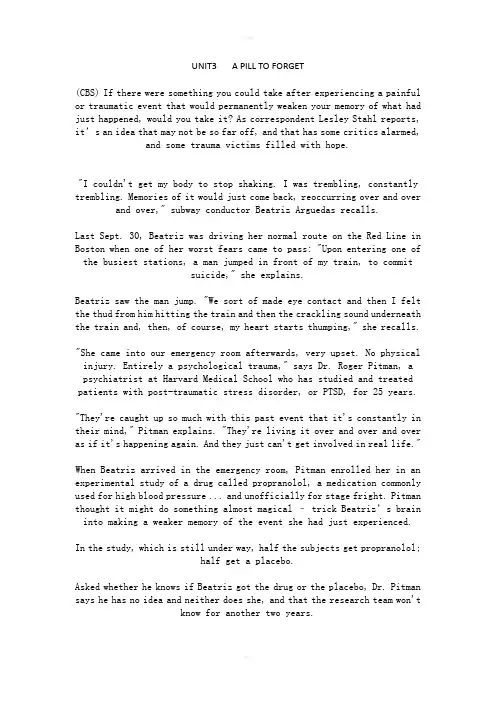英语高级视听说 下册 unit15
- 格式:doc
- 大小:38.50 KB
- 文档页数:6




Unit 15 DestinationsPeriod Two ReadingII. Teaching procedures.Activity 1. Check the assignment.Activity 2. Pre-readingFinish the pre – reading on p35.Activity 3. Reading prehension1. First readingRead the passage quickly and then answer the following questions.1)How do you like Rio de Janeiro?2) Why do people visit Kitzbuhel?Suggested answers:1) It’s amazing/attractive/wonde rful/beautiful/exciting…2) Because it is a world-class ski resort, a paradise for skiers.2. While reading1)What is Rio de Janeiro famous for?2)What does the word“Cariocas〞mean?Suggested answers:1)Rio de Janeiro is famous for its modern malls, theme parks and beautiful beaches.2)“Cariocas〞means the people of Rio de Janeiro.3.Post – readingFinish the following on P36Activity 4. DiscussionWhat do these sentences mean?1)Kitzbuhel is a paradise for skiers.2)A walk through downtown is a history lesson3)…a feast for the eyes4)Should you have enough energy left,…Suggested answers:1)It means that Kitzbuhel is a wonderful place for people who ski.2)Walking through downtown can help to learn about the history of Rio from what you see.3)A lively mix of old village culture and excitement of an international tourist area.4)If you should have enough energy left,…Homework:1. Finish LANGUAGE STUDY on P372. Read the text again after class3. Preview Grammar----- The Nonfinite Verbs(I)。






UNIT3 A PILL TO FORGET(CBS) If there were something you could take after experiencing a painful or traumatic event that would permanently weaken your memory of what had just happened, would you take it? As correspondent Lesley Stahl reports, it’s an id ea that may not be so far off, and that has some critics alarmed, and some trauma victims filled with hope."I couldn't get my body to stop shaking. I was trembling, constantly trembling. Memories of it would just come back, reoccurring over and over and over," subway conductor Beatriz Arguedas recalls.Last Sept. 30, Beatriz was driving her normal route on the Red Line in Boston when one of her worst fears came to pass: "Upon entering one of the busiest stations, a man jumped in front of my train, to commitsuicide," she explains.Beatriz saw the man jump. "We sort of made eye contact and then I felt the thud from him hitting the train and then the crackling sound underneath the train and, then, of course, my heart starts thumping," she recalls."She came into our emergency room afterwards, very upset. No physical injury. Entirely a psychological trauma," says Dr. Roger Pitman, a psychiatrist at Harvard Medical School who has studied and treated patients with post-traumatic stress disorder, or PTSD, for 25 years."They're caught up so much with this past event that it's constantly in their mind," Pitman explains. "They're living it over and over and over as if it's happening again. And they just can't get involved in real life."When Beatriz arrived in the emergency room, Pitman enrolled her in an experimental study of a drug called propranolol, a medication commonly used for high blood pressure ... and unofficially for stage fright. Pitman thought it might do something almost magical – trick Beat riz’s brain into making a weaker memory of the event she had just experienced.In the study, which is still under way, half the subjects get propranolol;half get a placebo.Asked whether he knows if Beatriz got the drug or the placebo, Dr. Pitman says he has no idea and neither does she, and that the research team won'tknow for another two years.If Pitman is right, the results could fundamentally change the way accident victims, rape victims, even soldiers are treated after theyexperience trauma.The story begins with some surprising discoveries about memory. It turns out our memories are sort of like Jello – they take time to solidify in our brains. And while they're setting, it's possible to make them stronger or weaker. It all depends on the stress hormone adrenaline.The man who discovered this is James McGaugh, a professor of neurobiology at the University of California, Irvine.McGaugh studies memory in rats, and he invited Stahl to watch the making of a rat memory – in this case how a rat who's never been in this tank of water before learns how to find a clear plastic platform just belowthe surface."He’ll swim around randomly," McGaugh explains. The rat cannot see the platform, since his eyes are on the top of his head.The rat will swim around the edge for a long time, until eventually he ventures out and by chance bumps into the platform. The next day, he'll find the platform a little bit faster.But another rat, who had learned where the platform was the day prior, and then received a shot of adrenaline immediately afterwards, today swaminstantly to the platform.Adrenaline actually made this rat's brain remember better, and McGaugh believes the same thing happens in people. "Suppose I said to you, 'You know, I've watched your programs a lot over the years, and although it pains me to have to tell you this, I think you're one of worst people I've ever seen on … now don't take it, don't take it personally,'" McGaughsays."So, my stress system would go into overdrive, no question," Stahl says."Even with my telling you that it's not true, there's nothing to keep you from blushing, from feeling warm all over," McGaugh points out. "That's the adrenaline. And I dare say that you're gonna remember my having said that long after you've forgotten the other details of our discussion here.I guarantee it."McGaugh says that’s why we remember important and emotional events in our lives more than regular day-to-day experiences. The next step in his research was to see what would happen when adrenaline was blocked; he started experimenting with propranolol."Propranolol sits on that nerve cell and blocks it, so that, think of this as being a key, and this is a lock, the hole in the lock is blocked because of propranolol sitting there. So adrenaline can be present, but it can'tdo its job," McGaugh explains.McGaugh showed Stahl a third rat that had learned where the platform was on the previous day and then received an injection of propranolol. The next day, the rat swam around the edge, as if he had forgotten there everwas a platform out there.Across the country at Harvard, Roger Pitman read McGaugh's studies and a light bulb went on. "When I read about this, I said, 'This has got to be how post-traumatic stress disorder works.' Because think about what happens to a person. First of all, they have a horribly traumatic event, and they have intense fear and helplessness. So that intense fear and helplessness is gonna stimulate adrenaline," Pitman says. "And then what do we find three months or six months or 20 years later? Excessively strongmemories."Pitman figured he could block that cycle by giving trauma victims propranolol right away ... before adrenaline could make the memories too strong. He started recruiting patients for a small pilot study. One of the first was Kathleen Logue, a paralegal who had been knocked down in the middle of a busy Boston street by a bicyclist."He just hit the whole left side of my body. And it seemed like forever that I was laying in the middle of State Street, downtown Boston," Logueremembers.She says she was terrified that she was just going to get run over.As part of the study, Logue took propranolol four times a day for 10 days. Like the others who got the drug, three months later she showed no physiological signs of PTSD, while several subjects who got a placebo did. Those results got Pitman funding for a larger study by the NationalInstitutes of Health.But then the President’s Council on Bioethics condemned the study in a report that said our memories make us who we are and that "re-writing" memories pharmacologically … risks "undermining our true identity.""This is a quote. 'It risks making shameful acts seem less shameful or terrible acts less terrible than they really are,'" Stahl reads to Logue."A terrible act," she replies. "Why should you have to live with it every day of your life? It doesn't erase the fact that it happened. It doesn't erase your memory of it. It makes it easier to remember and function."David Magnu s, director of Stanford University’s Center for Biomedical Ethics, says he worries that it won't be just trauma victims trying todull painful memories."From the point of view of a pharmaceutical industry, they're going to have every interest in having as many people as possible diagnosed with this condition and have it used as broadly as possible. That's the reality of how drugs get introduced and utilized," Magnus argues.He’s concerned it will be used for trivial reasons. "If I embarrass myself at a party Friday night and instead of feeling bad about it I could take a pill then I'm going to avoid –not have to avoid making a fool of myselfat parties," Magnus says."So you think that that embarrassment and all of that is teaching us?"Stahl asks."Absolutely," Magnus says. "Our breakups, our relationships, as painful as they are, we learn from some of those painful experiences. They makeus better people."But while the ethicists debate the issue, the science is moving forward. Researchers have shown in rat studies that propranolol can also blunt oldmemories.Pitman wondered: Could it work in humans? He teamed up with Canadian colleague Alain Brunet, who searched for people with long-standing PTSD, like Rita Magil. She had suffered for three years from nightmares aftera life-threatening car accident.Another study subject is Louise O'Donnell-Jasmin, who was raped by a doctor at the age of 12. "He raped me on his desk, on a chair, and on the floor. It, for me, it was like I was dying inside," she remembers. "Theworld had ended."O'Donnell-Jasmin was haunted by the rape for more than 30 years. She never felt comfortable undressing in front of her husband and suffered from recurrent flashbacks and nightmares.The study was simple: Subjects came in and were asked to think about and write down every detail they could remember about their trauma; in Magil's case, her car accident, reactivating the memory in her brain. She was thengiven propranolol.Rita says she suffered no side effects.A week later, electrodes measured her body’s stress response as she listened to a retelling of her trauma. Asked what happened, Magil says,"No reaction."And she says she had no more nightmares.The patient who made the most dramatic recovery turned out to beO'Donnell-Jasmin, but there's a catch, because she was in a control group and therefore wasn’t supposed to improve at all.O'Donnell-Jasmin was given propranolol, but unlike Magil, she took the drug while watching a pleasant movie, not after telling every detail about her rape. And yet, a week later, she noticed a change. "I wake up. And I find myself undressing. And my husband is there. And I realize I'm undressing, and I'm not feeling as though I need to hide under the bedanymore," she explains.Asked if it is gone, O'Donnell-Jasmin says, "Yes. The link, what held the emotions to the memories, it's like the umbilical cord has been cut. And there is no way I can access the emotions anymore. And furthermore, everyday it gets better.""Louise got a great result. But, scientifically, it confused things,"Pitman says.He speculates that despite the pleasant movie, O'Donnell-Jasmin may have been thinking about the rape when she took the propranolol, and that'swhy it worked. "The only way we're going to know is to study another 10 or a hundred patients like Louise and see how it pans out,” Pitman says.That this drug could actually alter and weaken old memories means we're talking about a potentially revolutionary advance in treating posttraumatic stress disorder."Are you at all concerned that since propranolol is already out there available for doctors to prescribe for heart conditions, for stage fright, that some soldier who’s come back and is having terrible nightmares can go to his doctor and get it right now? Is that a concern for you, or nota concern?" Stahl asks McGaugh."No. Not a concern for me. Not a concern," he replies. "If it helps, whynot.""Let me tell you something that you told us before. I'm quoting you. 'It's like they went in and altered my mind,'" Stahl tells Louise.O'Donnell-Jasmin admits it's very creepy. "This study has taken away a part of me that's been in me for so long, and that I find very weird,"she says."It's not normal to have gone through a rape and feel nothing. Or to have gone through something traumatic … and feel as though it happened to somebody else," Stahl tells Pitman."Let's suppose you have a person who comes in after a physical assault and they've had some bones broken, and they're in intense pain. Should we deprive them of morphine because we might be taking away the full emotional experience? Who would ever argue that?" Pitman replies."No," Stahl says."Why should psychiatry be different? I think that somehow behind this argument lurks the notion that mental disorders are not the same as physical disorders. That treating them or not is more of an optionalthing," Pitman says.The studies are still in their early stages, so O'Donnell-Jasmin's apparent positive result isn't conclusive, though to her, it's absolutelyreal.Asked if there is any sense that she has lost any of her identity, O'Donnell-Jasmin says, "I have regained my identity. What was broken whenI was 12 was fixed. They have given me back myself."And now the U.S. military has taken note: Pitman recently heard from the Army that he will be receiving funding starting next summer to try the same propranolol experiment done with Magil and O'Donnell-Jasmin o treat American soldiers returning from Afghanistan and IraqUnit 4 Brain ManAlmost 25 years ago, 60 Minutes introduced viewers to George Finn, whose talent was immortalized in the movie "Rain Man." George has a condition known as savant syndrome, a mysterious disorder of the brain where someone has a spectacular skill, even genius, in a mind that is otherwise extremely limited.Morley Safer met another savant, Daniel Tammet, who is called "Brain Man" in Britain. But unlike most savants, he has no obvious mental disability, and most important to scientists, he can describe his own thought process. He may very well be a scientific Rosetta stone, a key to understanding the brain.________________________________________Back in 1983, George Finn, blessed or obsessed with calendar calculation, could give you the day if you gave him the date."What day of the week was August 13th, 1911?" Safer quizzed Finn."A Sunday," Finn replied."What day of the week was May 20th, 1921?" Safer asked."Friday," Finn answered.George Finn is a savant. In more politically incorrect times he would have been called an "idiot savant" - a mentally handicapped or autistic person whose brain somehow possesses an island of brilliance.Asked if he knew how he does it, Finn told Safer, "I don't know, but it's just that, that's fantastic I can do that."If this all seems familiar, there?s a reason: five years after the 60 Minutes broadcast, Dustin Hoffman immortalized savants like George in the movie "Rain Man."Which brings us to that other savant we mentioned: Daniel Tammet. He is an Englishman, who is a 27-year-old math and memory wizard."I was born November 8th, 1931," Safer remarks."Uh-huh. That's a prime number. 1931. And you were born on a Sunday. And this year, your birthday will be on a Wednesday. And you'll be 75," Tammet tells Safer.It is estimated there are only 50 true savants living in the world today, and yet none are like Daniel. He is articulate, self-sufficient, blessed with all of the spectacular ability of a savant, but with very little of the disability. Take his math skill, for example.Asked to multiply 31 by 31 by 31 by 31, Tammet quickly - and accurately - responded with "923,521."And it?s not just calculating. His gift of memory is stunning. Briefly show him a long numerical sequence and he?ll recite it right back to you. And he can do it backwards, to boot.That feat is just a warm-up for Daniel Tammet. He first made headlines at Oxford, when he publicly recited the endless sequence of numbers embodied by the Greek letter "Pi." Pi, the numbers we use to calculate the dimensions of a circle, are usually rounded off to 3.14. But its numbers actually go on to infinity.Daniel studied the sequence - a thousand numbers to a page."And I would sit and I would gorge on them. And I would just absorb hundreds and hundreds at a time," he tells Safer.It took him several weeks to prepare and then Daniel headed to Oxford, where with number crunchers checking every digit, he opened the floodgates of his extraordinary memory.Tammet says he was able to recite, in a proper order, 22,514 numbers. It took him over five hours and he did it without a single mistake.Scientists say a memory feat like this is truly extraordinary. Dr. V.S. Ramachandran and his team at the California Center for Brain Study tested Daniel extensively after his Pi achievement.What did he make of him?"I was surprised at how articulate and intelligent he was, and was able to interact socially and introspect on his own-abilities," says Dr. Ramachandran.And while that introspection is extremely rare among savants, Daniel?s ability to describe how his mind works could be invaluable to scientists studying the brain, our least understood organ."Even how you and I do 17 minus nine is a big mystery. You know, how are these little wisps of jelly in your brain doing that computation? We don't know that," Dr. Ramachandran explains.It may seem to defy logic, but Ramachandran believes that a savant?s genius could actually result from brain injury. "One possibility is that many other parts of the brain are functioning abnormally or sub-normally. And this allows the patient to allocate all his attentional resources to the one remaining part," he explains. "And there's a lot of clinical evidence for this. Some patients have a stroke and suddenly, their artistic skills improve."That theory fits well with Daniel. At the age of four, he suffered a massive epileptic seizure. He believes that seizure contributed to his condition. Numbers were no longer simply numbers and he had developed a rare crossing of the senses known as synesthesia."I see numbers in my head as colors and shapes and textures. So when I see a long sequence, the sequence forms landscapes in my mind," Tammet explains. "Every number up to 10,000, I can visualize in this way, has it's own color, has it's own shape, has it's own texture."For example, when Daniel says he sees Pi, he does those instant computations, he is not calculating, but says the answer simply appears to him as a landscape of colorful shapes."The shapes aren't static. They're full of color. They're full of texture. In a sense, they're full of life," he says.Asked if they?re beautiful, Tammet says, "Not all of them. Some of them are ugly. 289 is an ugly number. I don't like it very much. Whereas 333, for example, is beautiful to me. It's round. It's?.""Chubby," Safer remarks.'It's-yes. It's chubby,' Tammet agrees.Yet even with the development of these extraordinary abilities as a child, nobody sensed that Daniel was a prodigy, including his mother, Jennifer. But he was different."He was constantly counting things," Jennifer remembers. "I think, what first attracted him to books, was the actual numbers on each page. And he just loved counting."Asked if she thinks there?s a connection between his epilepsy and his rare talent, she tells Safer, "He was always different from-when he was really a few weeks old, I noticed he was different. So I'm not sure that it's entirely that, but I think it might have escalated it."Daniel was also diagnosed with Asperger?s Syndrome-a mild form of autism. It made for a painful childhood."I would flap my hands sometimes when I was excited, or pull at my fingers, and pull at my lips," Tammet remembers. "And of course, the children saw these things and would repeat them back to me, and tease me about them. And I would put my fingers in my ears and count very quickly in powers of two. Two, four, eight, 16, 32, 64.""Numbers were my friends. And they never changed. So, they were reliable.I could trust them," he says.And yet, Daniel did not retreat fully into that mysterious prison of autism, as many savants do. He believes his large family may have actually forced him to adapt."Because my parents, having nine children, had so much to do, so much to cope with, I realized I had to do for myself," he says.He now runs his own online educational business. He and his partner Neil try to keep a low profile, despite his growing fame.Yet the limits of his autism are always there. "I find it difficult to walk in the street sometimes if there are lots of people around me. If there's lots of noise, I put my fingers in my ears to block it out,' he says.That anxiety keeps him close to home. He can?t drive, rarely goes shopping, and finds the beach a difficult place because of his compulsion to count the grains of sand. And it manifests itself in other ways, like makinga very precise measurement of his cereal each morning: it must be exactly45 grams of porridge, no more, no less.Daniel was recently profiled in a British documentary called ?Brainman.? The producers posed a challenge that he could not pass up: Learn a foreign language in a week - and not just any foreign language, but Icelandic, considered to be one of the most difficult languages to learn.In Iceland, he studied and practiced with a tutor. When the moment of truth came and he appeared on TV live with a host, the host said, "I was amazed. He was responding to our questions. He did understand them very well and I thought that his grammar was very good. We are very proud of our language and that someone is able to speak it after only one week, that?s just great.""Do you think that Daniel, in a certain way, represents a real pathway to further understanding the brain?" Safer asks Dr. Ramachandran."I think one could say that time and again in science, something that looks like a curiosity initially often leads to a completely new direction of research," Ramachandran replies. "Sometimes, they provide the golden key. Doesn't always happen. Sometimes it's just mumbo-jumbo. But that may well be true with savants."Daniel continues to volunteer for scientists who want to understand his amazing brain. But he is reluctant to become what he calls ?a performing seal? and has refused most offers to cash in on his remarkable skills."People all the time asking me to choose numbers for the lottery. Or to invent a time machine. Or to come up with some great discovery," he explains. "But my abilities are not those that mean that I can do at everything."But he has written a book about his experiences, entitled "Born on a Blue Day."He also does motivational speeches for parents of autistic children-yet one more gift of his remarkable brain.But at the end of the day-genius or not-that brain does work a little differently."One hour after we leave today, and I will not remember what you look like. And I will find it difficult to recognize you, if I see you again. I will remember your handkerchief. And I will remember you have four buttons on your sleeve. And I'll remember the type of tie you're wearing. It's the details that I remember," Tammet tells Safer.And it?s the details that make us all so different. One man may see numbers as a tedious necessity of modern life, another sees them as the essence of life."Pi is one of the most beautiful things in all the world and if I can share that joy in numbers, if I can share that in some small measure with the world through my writing and through my speaking, then I feel that I will have done something useful," he says.Unit 5We all know how ships are born, how majestic vessels are nudged into the ocean with a bottle of champagne. But few of us know how they die. And hundreds of ships meet their death every year. From five-star ocean liners, to grubby freighters, literally dumped with all their steel, their asbestos, their toxins on the beaches of some the poorest countries in the world, countries like Bangladesh. You can't really believe how bad it is here, until you see it. It could be as close as you'll get to hell on earth, with the smoke, the fumes, and the heat. The men who labor here are the wretched of the earth, doing dirty, dangerous work, for little more than $1 a day. It's not much of a final resting place, this desolate beach near the city of Chittagong on the Bay of Bengal. Ships are lined up here as at any port, but they'll never leave. Instead, they will be dissected, bolt by bolt, rivet by rivet, every piece of metal destined for the furnaces to be melted down and fashioned into steel rods. The ships don't die easily - they are built to float, not to be ripped apart, spilling toxins, oil and sludge into the surrounding seas. The men who work here are dwarfed by the ships they are destroying. And theydissect the ships by hand. The most sophisticated technology on the beachis a blowtorch. The men carry metal plates, each weighing more than a ton from the shoreline to waiting trucks, walking in step like pallbearers,or like members of a chain gang. They paint images of where they would like to be on the trucks - pictures of paradise far from this wasteland. And when night falls, the work continues and the beach becomes an infernoof smoke and flames and filth. This industry, which employs thousands and supplies Bangladesh with almost all its steel, began with an accident- a cyclone to be precise. In 1965, a violent storm left a giant cargo ship beached on what was then a pristine coastline. It didn't take long before people began ripping the ship apart. They took everything and businessmen took note - perhaps they didn't need a storm to bring ships onto this beach here. Mohammed Mohsin's family has become extremely wealthy bringing ships onto these beaches. He pays millions of dollarsfor each ship and makes his profit from the steel he sells. The name of his company is PHP, which stands for Peace, Happiness and Prosperity. His latest acquisition is a ship weighing in at 4,000 tons but Mohsin tells Simon that's small by comparison to other vessels that have been guttedon the beaches. They have handled ships as large as 68,000 tons. This the first time Mohsin has seen the 4,000 ton ship close up. In fact buyinga ship is not at all like buying a car. He didn't even need to see a picture before he bought itfor $14 million. All he needed to know was its weight and how much the owners were charging for each ton of steel. One of the single most valuable parts of the ship is the propeller. The "small" ships propelleris worth around $35,000 alone, Mohsin estimates. It may be a small ship to Mohsin, but getting onto it from the beach is still a bit delicate. Mohsin's ships don't have seafaring captains anymore - he is the captain now of dying ships and the captain of one of the largest of 30 shipyards on this 10-mile stretch of beach. Some 100 ships are ripped apart on the beach each year, most of them from the west. "It is the west's garbage dump," says Roland Buerk, who lives in Bangladesh. He spent a year in these yards, writing a book about the industry. 60 Minutes hired him to guide Simon through the tangled world of shipbreaking. To do the same work in America or England would be very expensive. "It would be becausein Europe and America when they do this, they do it in dry docks," Buerk explains. "So in actual fact, the owners of these ships are selling them to the yard owners here to break up. If they had to do it in America, they'd have to pay for that process to be carried out. So you see it makes real economic sense to do it here." "So old, out-dated ships that were previously a liability, are now an asset," Simon remarks. "Exactly," Buerk agrees. "And that's why they end up on these shores." They are the shores of the most densely populated nation and one of the poorest nations in the world. Bangladesh desperately needs steel for construction but has no iron ore mines. The shipbreaking yards are its mines, providing 80 percent of the nation's steel. But steel is only part of the deal; there are so many things on a ship which are sold off. It is in fact a gigantic recycling operation. You can find everything, including kitchen sinks, at a sprawling roadside market which goes on for miles. When you're driving down this road, it's not a problem if you need a toilet or a life boat or a light bulb. It is estimated that 97 percent of the ship's contents are recycled. The other three percent, the stuff nobody would buy, including。

高二英语新教材下册Unit15 Destinations2(人教版高二英语下册教案教学设计)Unit 15 DestinationsⅠ.Brief Statements Based on the UnitMore and more people like going on a trip to a faraway destination with the development of society.But before we start,we should know more about the destination we have chosen.This unit is arranged about the central topic-Destinations.In Warming up,teacher will ask students to talk about the routes and more places in the world,improving the students’ geography know ledge.In studying the reading material “Destinations”,the students will know more sights in the world and other things with the help of the teacher.By studying this unit,students will also know that finding out more about the destination is not only a good way to save money and avoid problems,it can also be a lot of fun.As to Grammar-Non-finite Verbs,a number of exercises are arranged.After doing them,students will master some knowledge of the Infinitive,the v.-ing and the Past Participle,and know how to use them.Ⅱ.Teaching Goals1.Talk about travel and cities.2.Practise making complaints.3.Review the Non-finite Verbs(1):-ing,-ed,to do…4.Write a descriptive essay/paragraph.Ⅲ.Background Information1.How to plan Your TripPeople are always telling us that“getting there is half the fun”.But is it true?Is it always true?Of course,we can all remember many enjoyable trips we have taken.But haven’t weall taken a trip that wasn’t fun at all?Can we ever forget the time when we just wanted to come home?The fact is,some people who travel for pleasure get no pleasure from it at all.Others,who travel because they must travel,have a lot of fun doing it.What makes one trip more enjoyable than another?The answer is planning.Any trip can be enjoyable if it is well planned.Every minute that you spend planning your trip may save you ten minutes of trouble during your trip.It may also add an hour of pleasure!MoneyBefore you take any trip,the first question to ask yourself is:How much can I spend?When you decide on a figure,write it down.Now you can decide where,when,and how to go.At home,you can find out what it costs to travel anywhere in the world.Just pick up the phone and call a travel agent(旅行社).In Season(旅游旺季),Off Season(旅游淡季)Many resorts(旅游胜地) nd cities around the world are popular during some months of the year and less popular during other months.Find out if the places you are visiting have an “in” season and“off”season.This may help you to decide when you want to go.There are some very good reasons to travel during the off ually everything is much cheaper.It is also less crowded,of course.If you don’t have a lot of money-or if you don’t like crowds of tourists(游客)-go in the off season.Some places are not as exciting during the off season.The weather may be too cold or too hot.The beaches may be closed.Hotels and restaurants(餐馆) ay be shut.Be sure to find out before you go.Passports(护照),Visas(签证) nd Health Certificates(健康证明) It is not hard to get a passport,but you should ask for one a few months before you begin your journey.T o get one you must have your birth certificate or another legal document(合法文件) o prove that you are a citizen(公民).Sometimes you need a visa to visit a country.If a visa is necessary,you can a sk for one at the country’s embassy(大使馆).Sometimes getting a visa takes many months,so it is very important to plan early.The same is true for health certificates.For this information it is a good idea to call or write the embassies.You may also get a lot of other useful information from them.Now that you have planned your trip,you are ready to take it.Should you expect any surprise?Of course you should.Let’s just hope they’re pleasant ones!2.Future Travel:TeleportationScience has changed the way we live and the way we think.New inventions and discoveries have made it possible for us to think about the world in new ways.The means of transportation-bikes,cars,airplanes-we use today are good examples.They are based on the idea that transportation means moving something from one place to another-on a bike,in a car or by plane.This takes time,of course,and we can only travel as fast as the laws of physics allow.It will be difficult to travel much faster than today’s airplanes and to travel very far,such as to the stars or to other planets.Now,scientists believe that we might be able to send things from one place to another without actually moving them through space.This sounds strange,but a new way of transportation may become possible in the future.Teleportation is a combination of sending information through telephones or the Internet and transportation.With normal transportation,for example by car or plane,a person or thing is moved from point A to point B.With teleportation,a person or thing is taken apart at point A and put together again at point B.If teleportation becomes possible,we may be able to travel faster and farther than we could ever imagine.In the 1990s,scientists discovered that teleportation was possible.Experiments showed that teleportation could be done,but the thing being teleported was destroyed on the way.So far,scientists have only been able to teleport photons-particles(粒子) hat carry light-and laser beams(激光).What about teleportation of human beings?Teleporting a human being would be very difficult since there are so many parts in a human body.Even the smallest mistake could cause serious problems with the person’s mind or body.There is still a long way from being able to use teleportation to move human beings,but what we used to think was impossible does now seem possible.What we know and what we imagine often work together:the more we know,the more we can imagine,and the more we imagine,the more we can learn.Science is the tool that we use to make our dreams become real and to build a new world with our ideas.Ⅳ.Teaching Time:Four periodsThe First PeriodTeaching Aims:1.Learn and master the following:(1)New words:airline,uncomfortable(2)Everyday English:I’m sorry to say…I’m so sorry.I hate to have to say this,but…Could you do something about…?Why didn’t you tell me the truth?Why don’t you do something about it?2.Train the students’ listening and speaking abilities.3.Get the students to talk about travel and cities.Teaching Important Points:1.Finish the task of listening to train the students’ listening ability.2.Finish the task of making complaints to train the students’ speaking ability.Teaching Difficult Point:How to help the students finish the tasks of listening and speaking.Teaching Methods:1.Free talk,listening and speaking to train the students’ ability to use English.2.Individual,pair or group work to make every student take an active part in class.Teaching Aids:1.the multimedia2.the blackboardTeaching Procedures:Step Ⅰ Greetings and Lead-inT:Hello,everyone.Ss:Hello,teacher.T:Sit down,please.First I want to ask you a simple question:what would you like to do most during holidays?Ss:Traveling/Reading books/Watching TV…T:Yes.Most of you like traveling.Where have you been to?Ss:Beijing/Shanghai/Qingdao/Harbin…T:Is there anybody who has been to a foreign country for travel?Ss:No.T:Do you hope to travel around the world?Ss:Yes,of course.T:Then you must know some famous cities in the world.Tell me their names,please.Ss:Paris,Moscow,Sydney,San Francis co,Berlin…T:Oh.So many!And they are all world-famous travel destinations.Today,we’ll begin to learn Unit 15 Destinations.(Bb:Unit 15 Destinations)It’s a good chance to talk about travel and cities.Are you interested?Ss:Yes.T:First let’s learn some new words for this period.(Teacher shows the following words on the screen and asks one student to read them.Then ask the whole class to read together after him/her.)△complaint /km′pleint/ n.投诉;申诉;抱怨,表示不满△Iraq/i′ra:k/ n.伊拉克△Mexico/′meksiku/ n.墨西哥△Greenland/′gri:nlnd/ n.格陵兰airline/′e′lain/ n.航空公司;航线uncomfortable /n′kmftbl/ adj.不服的,令人不自在的△wanderlust /′wdndlst/ n.漫游癖Step Ⅱ Warming upT:OK.Now please open your books at Page 33 and look at the first part-Warming up.Imagine that you are offered a free ticketthat lets you travel around the world and make five stops along the way.Can you follow me?Ss:Yes.T:OK.Now,please work in pairs to tell each other where would you go and why.At the same time,draw your flight line in the box on the right and mark the cities you want to visit on the map.A few minutes later,I’ll ask some students to talk about your travel plan.Is everything clear?Ss:Yes.(The students begin to work.Teacher goes among the class to see their work.At the end,teacher asks some students to talk about their plans.)Step Ⅲ ListeningT:Now,let’s come to the second part-Listening.First,look at the following pictures taken of some foreign cities.Look at the first picture taken of Greece.What part of Greece do you think the picture shows?Any volunteer?S1:I think it is the Egean Sea that the picture shows.T:Then look at the second picture taken of Iraq.What can you see in it?S2:……(Teacher and the students talk about the pictures briefly.After that,teacher says the following.)T:OK.Now,let’s listen t o the tape and do some exercises.The first time I play the tape,just listen to get the general idea.The second time,write down the answers.If there is difficulty in writing down the answers,I’ll play it again.At the end,we’ll check the answers together.Is that clear?Ss:Yes.(Teacher begins to play the tape.)Step Ⅳ SpeakingT:We’ve talked a lot about travel and cities.However,while you are traveling,you may come across some problems unexpectedly,which could take place in the airline,the hotel or the restaurant.Can you guess what problems would occur?Ss:Luggage is lost./The plane is late./The food is terrible…T:What shall we do if we come across such problems?Ss:Go to the manager and complain to him/her of the problems.T:How do you think he/she will deal with the problems?Ss:First,he/she may explain,apologize or argue.Then/he/she will do something about the problems.T:Yes.If I were the manager,I would do like that as I see fit.Do you understand “see fit”?Ss:No.T:“See fit” means “consider it corr ect,convenient or acceptable.”We can also use“think fit” to express the same meaning.For example,“Do as you think fit.”Do you understand?Ss:Yes.T:OK.Now,please look at the last part-Speaking.Here are three situations about problems with services given to you.First,read the situations.Then choose one of them to act it out with your partner according to the role cards.Besides,don’t forget to study the useful expressions below the role cards and use them in your dialogue if possible.Is everything clear?Ss:Yes.T:Well.Begin your work now.A few minutes later,I’ll ask some pairs to act out your dialogues before class.A sample dialogue:Student A:Manager Student B:GuestA:How do you feel to live in our hotel?B:On the whole,not so bad,but the room I am living in faces a noisy street,and I’m a light sleeper,so it is impossible for me to fall asleep.Could you please do something about it?A:I’m so sorry.I’ll make an arrangement for you as soon as possible.Anything else?B:I hate to have to say this,but the bed in my room makes me feel uncomfortable.A:That’s too bad.I’ll settle this problem at once.B:It’s very kind of you.Oh,by the way,would you please send someone to have a check on the supply of the hot water?There is no hot water at all.A:I see.I’ll do that.S tep Ⅴ Summary and HomeworkT:Thank you for your wonderful performance.Now,let’s see what we’ve done in this class.First,we’ve talked about travel and cities.Second,we’ve practised listening.Third,we’ve talked about problems with services one may come across while travelling and practised making complaints.Of course,we’ve learned some useful expressions,such as “I’m sorry to say…”,“I hate to have to say this,but…”,“Could you do something about…?”…(Teacher writes them on the blackboard.)After class,practise them more and preview the next part-Reading.That’s all for today.See you.Ss:See you.Step Ⅵ The Design of the Writing on the lackboardUnit 15 DestinationsThe First PeriodI’m sorry to say…I hate to have to say this,but…Could you do something about…?I’m so sorry.Why didn’t you tell me the truth? Why don’t you do something about it? Step Ⅶ Record after Teaching。
注:尊敬的各位读者,本文是笔者教育资料系列文章的一篇,由于时间关系,如有相关问题,望各位雅正。
希望本文能对有需要的朋友有所帮助。
如果您需要其它类型的教育资料,可以关注笔者知识店铺。
由于部分内容来源网络,如有部分内容侵权请联系笔者。
Unit 15 Destinations一. 单项选择1. Mr. Jones said he was looking _____ the possibility of buying a house.A. intoB. afterC. down uponD. out for2. I’m _____ of watching television; let’s go for a walk.A. boredB. scaredC. tiredD. fed3. Finding her car stolen,_____.A. a policeman was asked to helpB. the area was searched thoroughlyC. it was looked for everywhereD. she hurried to a policeman for help4. _____ white, the kitchen looks much better than before.A. PaintsB. PaintedC. PaintingD. To paint5. I’ve worked with children before, so I know what _____ in my new job.A. expectedB. to expectC. to be expectingD. expects6. Working hard is not a only _____ of great success, but it is among the essential requirements.A. signB. signalC. guaranteeD. supposition7. He was _____ into the possibility of buying a house.A. lookingB. runningC. turningD. getting8. The doctor _____ an X-ray test, and then, he could make a conclusion.A. urged me to haveB. urged me havingC. urged againstD. urged on me9. He _____ his pen in the ink.A. dippedB. dugC. dirtD. dyed10. She _____ his letter into little pieces.A. brokeB. smashedC. toreD. cracked11. _____ a new plane takes off.A. Every now and thenB. Just nowC. Then and thereD. Now then12. I don’t _____ to tell you all my plans.A. seeB. see fitC. see aboutD. see out13. _____ she didn’t like the teacher, she shouldn’t have stayed away from the class.A. BecauseB. HoweverC. EvenD. As14. John works _____ in the gym two hours every day.A. outB. things outC. themselves outD. round15. She always makes some _____ over shortages and high prices.A. dislikesB. complaintsC. troublesD. discontents二. 完形填空About one hundred and seventy years ago there 16 a great general 17 name was Napoleon Bonaparte. He was leader of the French army, and France was 18 with nearly all the countries around. He wanted very much to take his soldiers into 19 , but between France and Italy there are high mountains called the Alps, 20 are covered with snow.“Is it possible to cross the Alps?” said Napoleon.The men who had been sent to look at the 21 over the mountains shook their heads.Then one of them said, “It may be possible, but…”“Let me hear 22 ,” said Napoleon. “23 to Italy.”People 24 the thought of an army of sixty thousand men 25 the Alps when there was 26 road. 27 Napoleon waited only to see that everything was in good order, and then he gave the 28 to march.The long line of soldiers and horses and cannons 29 for twenty miles. When they came to a 30 place where there seemed to be no way to go further, the trumpets(小号) sounded “ 31 !” Then every man 32 , and the whole army moved right forward.Soon they were 33 over the Alps. In the next four days they were marching 34 the plain of Italy. “The man who has made up his mind to win,”said Napoleon, “will never say: 35 .”16.A.lied B. had C. seemed D. lived17.A.his B. who’s C. whose D. which18.A.at war B. angry C. fought D. satisfied19.A.England B. Russia C. Italy D. Germany20.A.which tops B. they C. there D. the tops of which21.A.maps B. passes(关口) C. ways D. sky22.A.no longer B. it C. no more D. your advice23.A.Forward B. Back C. Give up D. Cross24.A.agreed to B. were excited C. doubted(怀疑) D. laughed at25.A.across B. over C. crossing D. being on26.A.no B. not C. only D. narrow27.A.Though B. So C. But D. For28.A.whistle B. order C. suggestion D. clothes and food29.A.marched B. stretched(延伸) C. walked D. reached30.A.steep(陡峭的) B. large C. wild D. wet31.A.Rest B. Climb C. Move D. Charge(冲锋)32.A.stopped B. did his best C. laughed D. encouraged33.A.hungry B. cold C. safe D. lucky34.A.on B. by C. in D. at35.A.can’t B. difficulty C. dangerous D. impossible三. 阅读理解Language learning begins with listening. Children are greatly different in the amount of listening they do before they start speaking, and later starters are often long listeners. Most children will "obey" instructions some time before they can speak, though the word "obey" is hardly accurate as a description of the eager and delighted cooperation usually shown by the child. Before they can speak, many children will also ask questions by gesture and by making questioning noises.Any attempt to study the development from the noises babies make to their first spoken words leads to considerable difficulties. It is agreed that they enjoy making noises, and during the first few months one or two noises sort themselves as particularly expressive as delight, pain,friendliness, and so on. But since these can't be said to show the baby's intention to communicate, they can hardly be regarded as early forms of language. It is agreed, too, that from about three months they play with sounds for enjoyment, and that by six months they are able to add new words to their store. This self-imitation leads to deliberate imitation of sounds made or words spoken to them by other people. The problem then arises as to the point at which one can say that these imitations can be considered as speech.It is a problem we need to get our teeth into. The meaning of a word depends on what a particular person means by it in a particular situation and it is clear that what a child means by a word will change as he gains more experience of the word. Thus the use at seven months of "mama" as a greeting for his mother can not be dismissed as a meaningless simply because he also uses it at other times for his father, his dog, or anything else he likes. Playful and meaningless imitation of what other people say continues after the child has begun to speak for himself. I doubt, however, whether anything is gained when parents take advantage of this ability in an attempt to teach new sounds.36. Before children started speaking________ .A. they need equal amount of listeningB. they need different amounts of listeningC. they are all eager to cooperate with the adults by obeying spoken instructionsD. they can't understand and obey the adult's oral instructions37. Children who start speaking later________ .A. may have problems with their listeningB. probably do not hear enough language spoken around themC. usually pay close attention to what they hearD. often take a long time in learning to listen properly38. A baby's first noise are________ .A. an expression of his moods and feelingsB. an early form of languageC. a sign that he means to tell you somethingD. an imitation of the speech of adults39. The problem of deciding at what point a baby's imitations can be considered asspeech________ .A. is important because words have different meanings for different peopleB. is not especially important because the changeover takes place graduallyC. is one that should be properly understood because the meaning of words changes with ageD. is one that should be completely ignored because children's use of words is often meaningless40. The speaker implies _______.A. parents can never hope to teach their children new soundsB. children no longer imitate people after they begin to speakC. children who are good at imitating learn new words more quicklyD. even after they have learnt to speak, children still enjoy imitating四. 改错We are all busy talking about and use the Internet, 41. ______which set up in the 1960s. At first the Internet was 42. ______only used by the government, but, in the early 1970s, 43. ______the universities, hospitals and banks were allowed to 44. ______use it too. However, computers were even very expensive 45. ______and the Internet was difficult to be use. By the start 46. ______of the 1990s, computers become cheaper and easier. 47. ______ Today it is easy to get on-line and it is told 48. ______that million of people use the Internet every day. 49. ______Send e-mail is more and more popular among students. 50. ______五. 书面表达请你写一篇100词左右的短评,内容如下:1.近视是目前存在于我国年轻人当中的一个严重问题,约有2/3的年轻人近视。
When Prince Charles arrives in New York on Tuesday, Nov. 1, to begin an eight-day visit, it will be his first official American tour in more than a decade.
Everyone knows what has happened in the interim. His troubled marriage to the late Princess Diana, his remarriage to Camilla Parker Bowles, and the youthful indiscretions of his two sons have been turned to a reality-based soap opera by the tabloid media. But most Americans know very little about who the Prince of Wales is and what he does as heir to the British throne.
Members of the royal family hardly ever grant interviews, the Queen has never given one, and you rarely see them talk. But last month, as his trip to the United States was being planned, Prince Charles granted 60 Minutes correspondent Steve Kroft an audience, allowing us to follow him around and chat, not about his family, but about being Prince of Wales, a job and a life like no other.
"Most of us in our lives have to fill out applications listing our profession and occupation. You don't have to do that," Kroft said.
"No. Not always, but sometimes," Prince Charles replied. "If you did, what would you put down?" Kroft asked. "I would list it as worrying about this country and its inhabitants. That's my particular duty. And I find myself born into this particular position. I'm determined to make the most of it. And to do whatever I can to help. And I hope I leave things behind a little bit better than I found them," the prince said. "It's hard to say, but I think it is a profession, actually; doing what I'm doing. Because if you tried it for a bit, you might find out how difficult it is," he added, laughing.
He is somewhere between a brand and a public institution, a future head of state in waiting — and waiting. He is a symbol of continuity with no real power but tremendous influence that is tied to his position and wealth.
The money comes from a 14th century real estate empire called the Duchy of Cornwall, which was established to provide an income for the heir to the British throne.
Today it includes 135,000 acres of farmland, forests, waterfront property, London real estate, and even a cricket stadium. It produces $25 million a year in rents and other income that supports the prince, his wife and children and a staff of 130. There are perks such as travel on the royal train. And $7 million from the government to help with official expenses. On a recent trip to the Yorkshire Countryside to mark the 850th anniversary of the village of Richmond, the whole town turned out to greet Charles and Camilla, his new wife, longtime friend and former mistress, now the Duchess of Cornwall. They were recently voted the most popular couple in Britain, nosing out the Queen and Prince Philip and they seemed comfortable with each other and the crowds.
"There was clearly a bond between you and the people there. Explain that to me," asked Kroft.
"No idea," the prince replied with laugh. "You have no idea?" Kroft asked. "No, but I always enjoyed seeing all sorts of people all around the country. I do this over and over again, have done for 30-something years," the prince said.
He could pass the time playing polo or do nothing at all if he wanted, a path chosen by most of his predecessors, many of whom were lay-abouts and playboys. But Charles chose to invent a job where none existed. He made 29 major speeches last year, visited 14 countries, and runs the largest group of non-profit organizations in the country called "Prince's Charities." He raises more than $200 million a year for those 16 organizations, 14 of which he founded.
The largest charity is The Prince's Trust which, over 29 years, has helped to provide job training for more than a half a million young people.
"Do you think if you weren't doing this stuff, that it would get done?" Kroft asked. "If I wasn't doing it? No," the prince replied. Asked if he felt as if he was making a difference, Prince Charles said, "I don't know. I try. I only hope that when I'm dead and gone, they might appreciate it a little bit more. Do you know what I mean? Sometimes that happens."
As he approaches his 57th birthday, he sometimes feels misunderstood and undervalued. He was educated at Cambridge, can fly jet planes and helicopters, is extremely knowledgeable about the arts, and has tried to carve out for himself a number of different careers — environmentalist, urban planner, real estate developer, and social critic — deeply committed to a vision of what Great Britain was and should be.